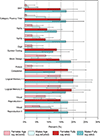Mayo normative studies: regression-based normative data for ages 30-91 years with a focus on the Boston Naming Test, Trail Making Test and Category Fluency
- PMID: 38014536
- PMCID: PMC11014770
- DOI: 10.1017/S1355617723000760
Mayo normative studies: regression-based normative data for ages 30-91 years with a focus on the Boston Naming Test, Trail Making Test and Category Fluency
Abstract
Objective: Normative neuropsychological data are essential for interpretation of test performance in the context of demographic factors. The Mayo Normative Studies (MNS) aim to provide updated normative data for neuropsychological measures administered in the Mayo Clinic Study of Aging (MCSA), a population-based study of aging that randomly samples residents of Olmsted County, Minnesota, from age- and sex-stratified groups. We examined demographic effects on neuropsychological measures and validated the regression-based norms in comparison to existing normative data developed in a similar sample.
Method: The MNS includes cognitively unimpaired adults ≥30 years of age (n = 4,428) participating in the MCSA. Multivariable linear regressions were used to determine demographic effects on test performance. Regression-based normative formulas were developed by first converting raw scores to normalized scaled scores and then regressing on age, age2, sex, and education. Total and sex-stratified base rates of low scores (T < 40) were examined in an older adult validation sample and compared with Mayo's Older Americans Normative Studies (MOANS) norms.
Results: Independent linear regressions revealed variable patterns of linear and/or quadratic effects of age (r2 = 6-27% variance explained), sex (0-13%), and education (2-10%) across measures. MNS norms improved base rates of low performance in the older adult validation sample overall and in sex-specific patterns relative to MOANS.
Conclusions: Our results demonstrate the need for updated norms that consider complex demographic associations on test performance and that specifically exclude participants with mild cognitive impairment from the normative sample.
Keywords: Cognitive aging; animal fluency; base rates; executive function; mild cognitive impairment; neuropsychological tests; neuropsychology; psychometrics.
Figures



References
-
- Alden EC, Lundt ES, Twohy EL, Christianson TJ, Kremers WK, Machulda MM, … Stricker NH (2022). Mayo normative studies: A conditional normative model for longitudinal change on the Auditory Verbal Learning Test and preliminary validation in preclinical Alzheimer’s disease. Alzheimers Dement (Amst), 14(1), e12325. doi:10.1002/dad2.12325 - DOI - PMC - PubMed
Publication types
MeSH terms
Grants and funding
LinkOut - more resources
Full Text Sources
Medical

